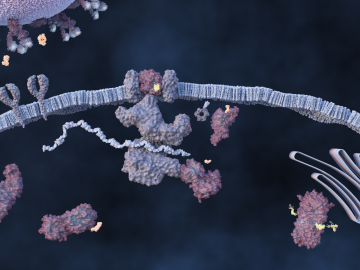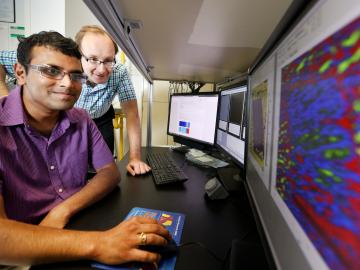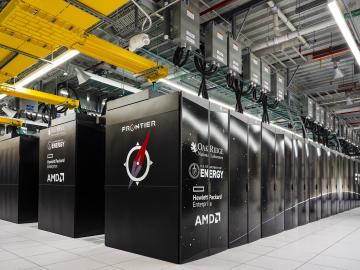
Filter News
Area of Research
- (-) Supercomputing (76)
- Advanced Manufacturing (2)
- Biological Systems (1)
- Biology and Environment (52)
- Biology and Soft Matter (1)
- Clean Energy (33)
- Climate and Environmental Systems (1)
- Computational Biology (1)
- Computational Engineering (1)
- Computer Science (1)
- Fuel Cycle Science and Technology (1)
- Fusion and Fission (29)
- Fusion Energy (5)
- Isotope Development and Production (1)
- Isotopes (10)
- Materials (31)
- Materials for Computing (3)
- National Security (23)
- Neutron Science (18)
- Nuclear Science and Technology (25)
News Type
News Topics
- (-) Artificial Intelligence (33)
- (-) Biomedical (12)
- (-) Climate Change (15)
- (-) Frontier (25)
- (-) Mathematics (1)
- (-) Nuclear Energy (3)
- (-) Space Exploration (2)
- 3-D Printing/Advanced Manufacturing (5)
- Big Data (14)
- Bioenergy (9)
- Biology (10)
- Biotechnology (2)
- Buildings (3)
- Chemical Sciences (4)
- Computer Science (77)
- Coronavirus (12)
- Cybersecurity (8)
- Decarbonization (4)
- Energy Storage (6)
- Environment (16)
- Exascale Computing (19)
- Grid (4)
- High-Performance Computing (31)
- Isotopes (1)
- Machine Learning (12)
- Materials (12)
- Materials Science (14)
- Microscopy (7)
- Molten Salt (1)
- Nanotechnology (10)
- National Security (8)
- Net Zero (1)
- Neutron Science (13)
- Partnerships (1)
- Physics (7)
- Quantum Computing (15)
- Quantum Science (20)
- Security (5)
- Simulation (11)
- Software (1)
- Summit (35)
- Sustainable Energy (8)
- Transportation (5)
Media Contacts

The U.S. Department of Energy’s Office of Science announced allocations of supercomputer access to 51 high-impact computational science projects for 2022 through its Innovative and Novel Computational Impact on Theory and Experiment, or INCITE, program.

An international problem like climate change needs solutions that cross boundaries, both on maps and among disciplines. Oak Ridge National Laboratory computational scientist Deeksha Rastogi embodies that approach.

An ORNL-led team comprising researchers from multiple DOE national laboratories is using artificial intelligence and computational screening techniques – in combination with experimental validation – to identify and design five promising drug therapy approaches to target the SARS-CoV-2 virus.

At the Department of Energy’s Oak Ridge National Laboratory, scientists use artificial intelligence, or AI, to accelerate the discovery and development of materials for energy and information technologies.

The Department of Energy’s Oak Ridge National Laboratory has licensed its award-winning artificial intelligence software system, the Multinode Evolutionary Neural Networks for Deep Learning, to General Motors for use in vehicle technology and design.

The U.S. Department of Energy’s Innovative and Novel Computational Impact on Theory and Experiment, or INCITE, program is seeking proposals for high-impact, computationally intensive research campaigns in a broad array of science, engineering and computer science domains.

Six scientists at the Department of Energy’s Oak Ridge National Laboratory were named Battelle Distinguished Inventors, in recognition of obtaining 14 or more patents during their careers at the lab.

Six ORNL scientists have been elected as fellows to the American Association for the Advancement of Science, or AAAS.

A multi-institutional team, led by a group of investigators at Oak Ridge National Laboratory, has been studying various SARS-CoV-2 protein targets, including the virus’s main protease. The feat has earned the team a finalist nomination for the Association of Computing Machinery, or ACM, Gordon Bell Special Prize for High Performance Computing-Based COVID-19 Research.

ORNL and three partnering institutions have received $4.2 million over three years to apply artificial intelligence to the advancement of complex systems in which human decision making could be enhanced via technology.


